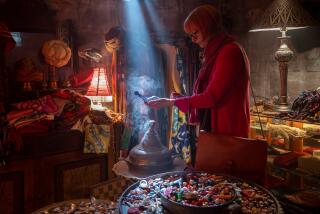Wings of Desire
- Share via
In 1808, the angel Xas spots Sobran, miserably lovesick son of a winemaker, stumbling drunk around a Burgundy field. Xas props him up with his wings and gives him amiable advice of the pull-yourself-together variety.
Over the next half-century Sobran marries, prospers and founds a prized Burgundy appellation. Xas cannot grow or even change, of course, but all manner of drastic things befalls him. The most drastic--apart from an eventual amputation of his wings--is the burgeoning of a passionate love affair with Sobran, lasting until the latter’s death.
“I had to have someone I could lose forever,” Xas declares, mourning (not grief-stricken, because angels can grieve but not really be stricken). As an angel he is haunted by mortal longings just the opposite of the immortal kind that beset human beings.
Elizabeth Knox spreads her odd and original gossamer over many things. There is her imagination of what, lying hidden or counter in human needs, might be fictionally represented by an angel and how to go about representing one. There is the notion of fertile haunting: how an active and powerful human, firmly embarked--the mature Sobran--might deviate invisibly and inexplicably, as a compass is shifted by an unseen lode of metal.
There is a rich tapestry of rural France in the last century: a rising peasant class, a wavering nobility and the craft of wine-making. Knox’s imagination resembles one of those Burgundy slopes, mysteriously sunned and fed, that produces a vintage unlike any other.
And yet “The Vintner’s Luck,” as much as it achieves, brings itself down. It is a plumed fall, like Icarus’, but a fall nonetheless, and paradoxically--again like Icarus--in the measure that the author succeeds in gaining impressive height.
Xas’ once-a-year visits are the hidden lode under Sobran’s public life. The public life includes, among other things, his early service in Russia with Napoleon’s army, his return to cultivate and expand the wine acres of his father and a dead friend, his marriage to the powerful and eccentric Celeste and his growing friendship with the local lord, the Count Valady, and his widowed niece, Aurore.
The count and his daughter may be the most sharply memorable of the book’s human figures, Sobran being so large and turbulent and standing so close to the reader’s eye level that he ends up more felt than seen. Count Valady is a rarity, a liberal rural nobleman, friend of such early 19th century radicals as Andre Chenier and a man with a deep feeling for history’s tides of succession.
Sobran is the new tide. He is “sharp-tongued, high-handed, a bully,” the count tells Aurore early in the story. “He fills me with fellow-feeling.” Aurore, passionately intellectual, grows closer and closer to Sobran--himself an avid reader and unquiet spirit--after her uncle’s death. Nearing old age, in fact, they become lovers.
This is the tautly realistic side of a triangle whose hypotenuse is metaphysical and otherworldly. As hypotenuses tend to do--remember childhood plane geometry?--it swoops us into a faintly unwell giddiness.
The love story of Sobran and Xas is concealed until the later years when, as in our own later years, vital secrets become a commonplace trait, like wrinkles. Displaying Knox’s rambunctious imagination and delicacy of style, here is Xas’ first appearance to the reeling Sobran: “Sobran fell against a warm, firm pillow of muscle. He lay braced by a wing, pure sinew and bone under a cushion of feathers, complicated and accommodating against his side, hip, leg, the pinions split around his ankle. The angel was breathing steadily and smelled of snow.”
Of course, that’s how an angel would smell. Knox is finely dexterous in limning the traits and temperament of hers. Xas is kindly and seemingly dispassionate at first, giving Sobran essential domestic advice--marry Celeste, build a wine cellar, hold back some of your wine to age (a new thought for the time)--and intensely curious about the details of his work and family.
There is a growing touchiness, though, a susceptibility, an effortful holding back. Xas exudes desire without avowing it; when Sobran, aroused in the course of the first few yearly meetings, kisses and tries to embrace him, Xas knocks him down. He is, he says enigmatically, an angel in a no-man’s-land between God and Lucifer. His pain belongs to the former, his pleasures to the latter, and he has no intention of letting Sobran fall. Yet year by year the resolve weakens; the two become annual lovers.
In fact, Xas is an angel in conflict. He fell along with Lucifer--when he reveals this, Sobran breaks down in shock, his hair turns white and, upon recovering, he has grown staid and somber. Bit by bit we learn that Xas has fallen from Lucifer as well. When he sneaks into Heaven as a favor to Sobran, who wants news of a dead daughter, an attendant archangel inflicts a painful wound. Later Lucifer will come and cut off his wings. “You can keep him,” he tells the stunned Sobran, “but he’ll have to wear a shirt.”
Xas, the misfit angel, cannot keep the proper distance, whether holy or Satanic, from humanity, and both sides punish him for it. Sobran, loving him, furious at him, throwing him out, taking him in, is more than a beleaguered and agitated witness to the dilemma. If Xas, who can never be human, longs for the human, Sobran is tormented by a desire for the angelic. Old age provides a kind of amiable surcease. Wingless (though feathers are beginning to sprout), Xas is hired as tutor to Sobran’s children. Man, angel and Aurore take turns pairing off in bed.
Knox endows her angel with quirks, wit, temperament, fierce desire and pain, but she never falls into the trap of making him human. Xas is always the Other, and the author exquisitely imagines him that way.
Yet “The Vintner’s Luck,” for all its virtues, has a disconcerting hollowness to it. The problem may be with angels. True, if you manage to avoid making them human you can do many things with them, and Knox does. They can perform all kinds of angelicus ex machina roles: as instigators, trouble- makers, transformers, bestowers of power, clowns. They cannot be protagonists, though, particularly protagonists of the irremediably human attribute of passion. To try to make them is to force matters.
Angels are potent but oddly empty. God, after all, was surrounded by them but they must have been insufficient and for all their elegance, boring. He felt impelled to create people, in any case, and perhaps it is the same for novelists.
At Xas’ first appearance, Knox writes, “the angel’s youth and beauty were like a mask.” Masks are useful, sometimes magical, but they don’t make love and they don’t work the emotional stress and clash of fiction. In Spain a moment of silence among a gathering is remarked with the phrase: “an angel passed.” There is a silence at the heart of Knox’s ingenious and varied music.
More to Read
Sign up for our Book Club newsletter
Get the latest news, events and more from the Los Angeles Times Book Club, and help us get L.A. reading and talking.
You may occasionally receive promotional content from the Los Angeles Times.










